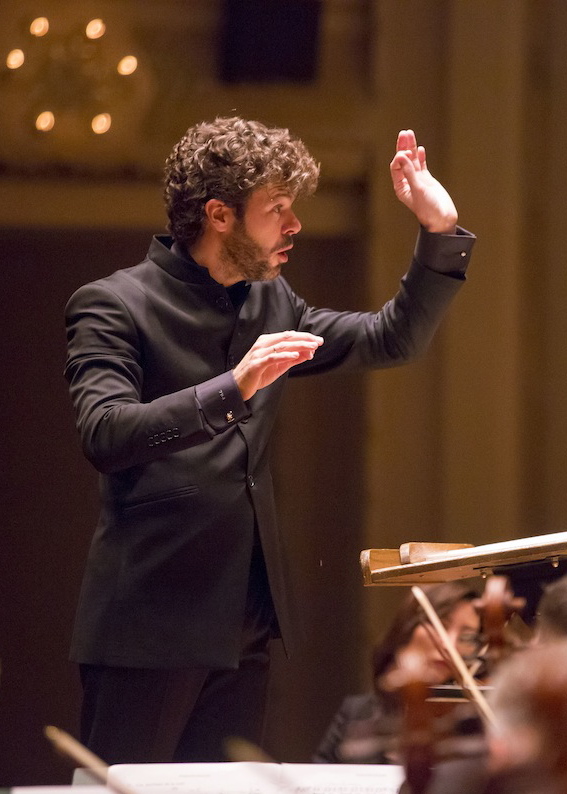The phantom of Boulez is honored by CSO, with superb direction from Heras-Casado
He may not be lurking in the subterranean tunnels under Michigan Avenue, but the grand old homme Pierre Boulez has morphed into a kind of Phantom of the Chicago Symphony Orchestra. The CSO’s conductor emeritus has departed, most likely for good, presumably due to health concerns, though the specific reasons have never been fully elucidated.
Yet the CSO continues to pay homage to the absent French composer-conductor in his 90th birthday season. This week brings both a “Beyond the Score” program honoring Boulez tonight and Sunday, as well as a CSO subscription program that Boulez “might have conducted.”
That’s a rather slender reed, but Wednesday’s concert offered largely impressive rewards–less due to Boulez’s music or influence but because of the return of the superb young conductor, Pablo Heras-Casado.
Boulez wrote an early version of his Figures-Doubles-Prismes in 1969, around the time he first conducted the CSO. Taking a page from Stockhausen’s Gruppen, Boulez’s first work for orchestra arranges standard symphonic forces in three divisions, a trio of harps anchoring a cruciform layout, with winds and brass split on the far sides, and violins in the center, with violas, cellos and basses behind.
As principal guest conductor in the 1990s, Boulez brought a great deal of excellence and consistency to CSO performances in the highly inconsistent Daniel Barenboim era. While acknowledging the remarkable transparency of his conducted performances, Boulez’s own music had usually left me cold, often coming across as too rarefied and intellectual for lesser mortals to comprehend.
Heras-Casado and the orchestra made about as strong a case for Boulez’s Figures-Doubles-Prismes as one will ever likely hear. Even with a short rehearsal week, Heras-Casado drew strikingly pure and luminous textures and a sure sense of ebb and flow, the sudden eruptive fortissimos as acutely balanced as the pianissimo percussion rustles.
Yet at 20 minutes, the music meanders and loses the thread, feeling like a work of intriguing incidents without a compelling overall structure or narrative. There’s a certain icy abstraction in Boulez’s musical algorithms that stubbornly refuses to find favor. Listening to this work makes one ponder if it’s possible to write music that is brilliant without being good.
A more traditional showpiece closed the shortened program at Wednesday’s Afterwork Masterworks program, Debussy’s Iberia.
It’s a bit of a cliche to expect a musician to bring some idiomatic naturalness to music of their native composers—or Spanish flavor via Paris, in the case of Debussy’s Mediterranean triptych.
Yet Heras-Casado indeed found a supple rhythmic swing in this evocative score that felt just right. Most striking is how much the Spanish conductor tamped down the brilliance compared to more high-stepping, percussion-led performances. The rhythmic lilt of “In the Streets and Byways” had a clipped, aggressive cut that brought a darker, tougher expression, removed from the usual sun-drenched aural postcard.
The central “Fragrance in the Night”—-can the CSO programs please go back to quoting scores in the original language?—was somewhat wanting in color and atmosphere, likely the victim of the short rehearsal week and the time spent on the Boulez piece. Yet Heras-Casado managed to shape the music with an assured hand and detailing, as with the fluent segue into the festive final section, which found a wry, satiric quality amid the lilting rhythms.
The centerpiece was music of Bartok, another Boulez specialty, with his Piano Concerto No. 3 last performed by Mistuko Uchida with Boulez conducting six years ago.
Making her CSO debut, Alice Sara Ott proved a rather uneven soloist Wednesday night. The willowy pianist has a tony Deutsche Grammophon contract yet in the first movement Allegretto her playing was fitfully underprojected and even sounded muffled. Granted, Bartok’s concerto—his last sort-of-completed work—is less overtly flashy than the two previous works in the genre, but we still need to hear the notes. Ott’s tendency to strike languid, album-cover poses at the keyboard didn’t help.
The soloist’s playing improved as the concerto unfolded. Prefaced by lovely warm string phrasing coaxed by Heras-Casado, Ott played the Adagio religioso in a stark plaintive manner that avoided sentimentality. The final movement went with worthy vitality—the orchestra in vital, crackling form—and while Ott tackled the virtuosic pages with polish and accuracy, her fitful bravura never really convinced that this is her kind of repertoire.
The program will be repeated 1:30 p.m. Friday and 8 p.m. Saturday with the addition of Stravinsky’s Four Studies for orchestra. cso.org; 312-294-3000.
Posted in Performances






